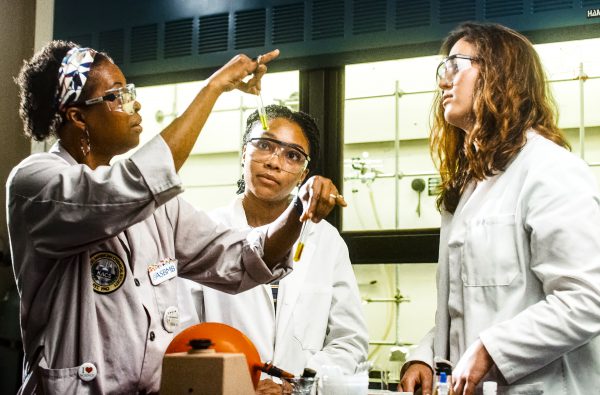
Regina Stevens-Truss, Kalamazoo College’s Dorothy H. Heyl Professor of Chemistry and Biochemistry, is the recipient of the 2023 American Society for Biochemistry and Molecular Biology (ASBMB) Award for Exemplary Contributions to Education.
The ASBMB is a professional organization of science, one of the largest of its kind in the world. The award, instituted in 2005, credits an individual who encourages an effective teaching and learning of biochemistry and molecular biology while demonstrating a commitment to pedagogical engagement and teaching innovation. As one of 14 professionals from around the world being honored by the ASBMB, Stevens-Truss will give a presentation about her teaching and learning trajectory at the society’s 2023 annual meeting, Discover BMB, in March in Seattle.
“Being selected for this honor surfaces all of my humble bones,” Stevens-Truss said. “Never in my wildest dreams did I foresee being nominated and even less being selected for this award. My imposter syndrome persona is in full bloom right now, and I can hear all of the voices that tell me regularly ‘accept a compliment, Regina.’ This award means the world to me, I am honored and humbled, and can’t believe the list of pioneers that my name will be listed with.”
Stevens-Truss served on the Minority Affairs Committee (MAC), now known as the Maximizing Access Committee, as well as on the Education and Professional Development (EPD) Committee of the ASBMB, where she was part of the steering committee that created the concept-driven teaching strategies that laid the foundation for the organization’s certification exam. She also was the principal investigator in 2012 of a National Science Foundation grant that supported a STEM K-12 outreach initiative by the society called Hands-on Outreach to Promote Engagement in Science (HOPES – see pages 37-38 at this link).
Since joining the faculty at K in January 2000, Stevens-Truss has been teaching Chemical Reactivity, Biochemistry, Medicinal Chemistry and Infection: Global Health and Social Justice. Current research in her lab focuses on testing a variety of compounds (peptides and small molecules) for antimicrobial activity. She is also the College’s director of the Howard Hughes Medical Institute Inclusive Excellence grant, which was awarded to K’s science division in 2018. In 2016, she received K’s highest teaching honor, the Florence J. Lucasse Lectureship for Excellence in Teaching.
Stevens-Truss earned a bachelor’s degree from Rutgers University and a Ph.D. in medicinal chemistry from the University of Toledo. She held two fellowships at the University of Michigan between 1993 and 1999, one of which was a lectureship in medicinal chemistry.
“I joined the faculty at K in a department with the BEST team of educators and students that I could have asked for,” she said. “From day one, my chemistry and biochemistry department colleagues have supported every hair-brained idea I have come up with. They make me think hard about teaching by always keeping our students front-and-center in our conversations on this topic. My students have pushed me to be better, to care more, to guide them through their journey of learning and growth. And, without all of these folks, this award would not have happened. This award is not just for me, but for all who have been in my life in the last 20-plus years. You know who you are!”
